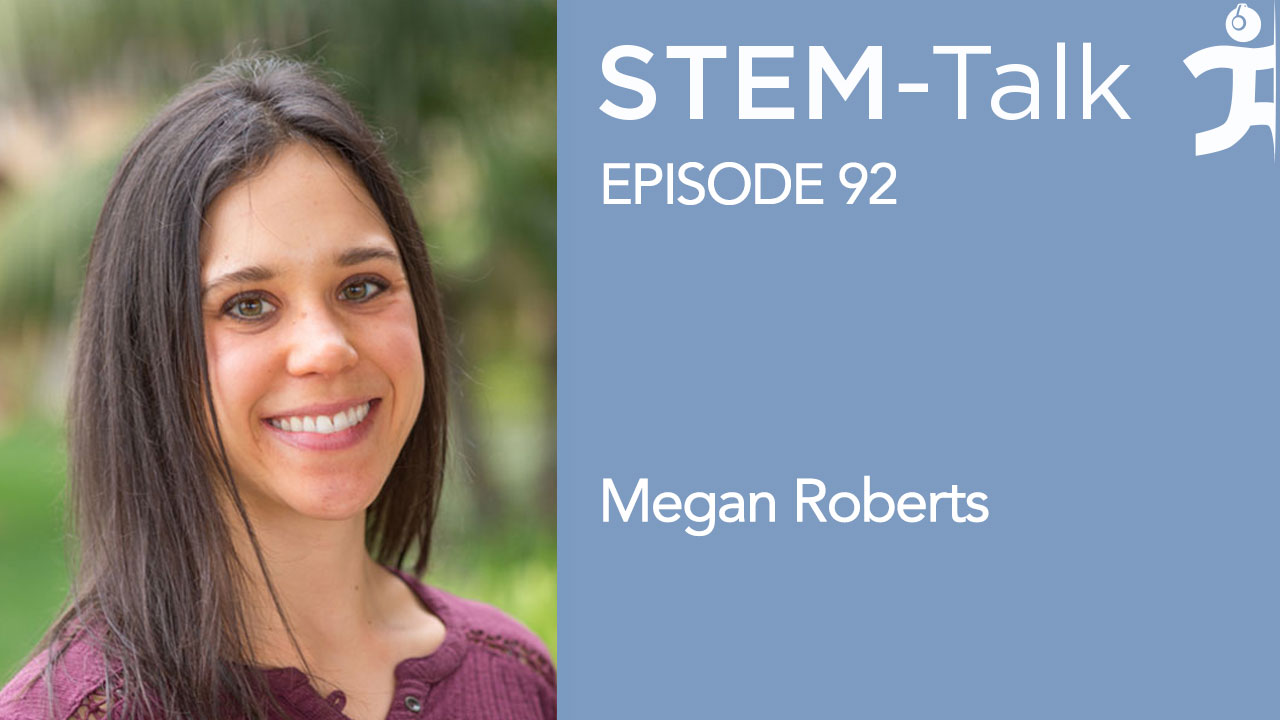STEM-Talk
Episode 92: Megan Roberts discusses the potential of a ketogenic diet to extend healthspan and lifespan
// Jul 9, 2019

Our guest today is Megan Roberts, a research scientist who conducted an interesting study that showeda ketogenic diet extended the longevity and healthspan of adult mice. This study has been discussed in several earlier episodes of STEM-Talk.
Megan conducted her research while earning a master’s degree in nutritional biology at the University of California, Davis.
Today, she is the scientific director at Nourish Balance Thrive, an online health-coaching company where Megan helps people optimize their heath and performance.
Show notes:
[00:02:53] Dawn begins the interview mentioning that Megan grew up in Northern California and asks Megan what she was like as a child. [00:03:20] Megan talks about how her interest in science started. [00:03:38] Dawn asks Megan how she became a martial arts instructor, teaching teen-agers as well as children as young as five years old. [00:04:02] Megan talks about her decision to attend the University of California, Davis. [00:04:16] Megan explains why she initially want to major in biochemistry, but decided toward the end of her freshman year to switch majors. [00:04:42] Ken asks Megan about her decision to stay at UC Davis to earn a master’s degree in nutritional biology. [00:05:08] Megan talks about the privilege of having open-minded professors and peers who were a part of her nutritional biology program at UC Davis. [00:06:07] Ken mentions that part of Megan’s thesis ended up in Cell Metabolism, in the form of a paper titeld, “A Ketogenic Diet Extends Longevity and Healthspan in Adult Mice.”The paper, Ken points out, has been discussed in several episodes of STEM-Talk. He asks Megan about the motivations behind her study. [00:07:41] Megan describes the three different diets used for the mouse studies. [00:08:30] Dawn mentions that an important aspect of the study was that all of the mice were fed the same number of calories every day. She asks Megan to explain the significance of this parameter. [00:09:23] Megan describes the various markers of physiological function that were measured how the study yielded interesting results in terms of healthspan in the mice. [00:10:14] Dawn asks how the memories of the mice were tested. Dawn also asks Megan to go into detail on the finding that mice on the ketogenic diet were having their memories preserved for longer. [00:11:13] Ken asks Megan how she tested the grip strength of mice. [00:12:05] Megan talks about the two areas of healthspan that saw the most dramatic effects with the ketogenic diet: memory and the preservation of motor-function. [00:12:39] Ken asks if Megan and her colleagues were surprised by the finding that lifespan was increased by 14 percent in the mice fed a ketogenic diet. [00:13:08] Dawn mentions that the ketogenic diet came out on top in the study, followed by the low-carb diet. Dawn mentions that those mice on the low-carb diet, however, surprisingly gained weight asks Megan is she was surprised by this. [00:14:35] Ken asks what lead Megan to the idea of studying the ketogenic diet as an intervention in midlife, as opposed to being a habit throughout life. [00:15:27] Dawn asks how well Megan thinks these mouse models are likely to translate to humans. [00:17:05] Ken asks what experiments Megan would have done to extend her findings reported in the Cell Metabolism paper if she had managed to have more time, funding and resources. [00:17:52] Dawn mentions that Megan’s study suggests that the metabolic changes that accompany carbohydrate restriction might indeed help increase lifespan. However, Dawn asks Megan about ketone bodies themselves (AcAc and BhB) and their potential role in the extension of healthspan. [00:18:13] Ken asks about Megan’s findings in regards to a tissue dependent mTORC1 signaling, in the context of skeletal muscle and the ketogenic diet. [00:20:26] Dawn asks Megan for her take on the tissue specific effects of ketones that she observed in her work. [00:21:12] Megan explains the effects of the ketogenic diet on insulin sensitivity. In her study, the ketogenic diet did not impair insulin sensitivity while the low-carb diet did. [00:22:55] Megan explains the key differences in the design and interpretation of her study versus a similar paper from Eric Verdin’s group, which reported that a cyclical ketogenic diet, but not a consistent one, improved healthspan in older mice. [00:24:13] Dawn asks Megan about her thoughts on the enrichment of a standard diet with exogenous ketones, and if there could be healthspan benefits from that. [00:24:47] Ken mentions a recent paper by Poffé, which suggested that a ketone ester can help prevent some of the negative effects of “over-reaching” in endurance training. [00:25:55] Ken asks if exogenous ketones have their most important effects when taken post-exercise, rather than pre-exercise. [00:27:02] Dawn asks if there are other untapped uses of endogenous or exogenous ketosis that people may not be considering. [00:27:39] Dawn asks Megan what her thoughts are on the communication and interpretation of science of this nature in the public domain, and what responsibilities she feels that university press officers and researchers have in this process. [00:29:34] Dawn mentions that Megan has taken over as chief scientific officer at Nourish Balance Thrive from Tommy Wood, who was interviewed on episode 47 and episode 48 of Stem-Talk. She asks what has led her to decide on her current career and why she has chosen to stay working with athletes as opposed to continuing graduate or medical school. [00:31:16] Megan explains what she does as a health coach. [00:31:45] Dawn asks if the general public could benefit from health coaching [00:32:57] Ken mentions the explosion of research and interest into the gut microbiome and recommends episode 20 of STEM-Talk, an interview with Alessio Fasano, as a primer. Ken then asks Megan about her own quest to recover her gut health, which she has discussed on the Nourish Balance Thrive podcast. [00:35:31] Dawn asks about Megan’s black-and-white, “type A” personality that can sometimes get her into trouble as a fitness enthusiast. [00:36:04] Megan talks about her recent article titled, “Why Your Diet Isn’t Working: Under Eating and Overtraining.” [00:40:00] Ken mentions the blood chemistry calculator project that Megan is working on with Tommy Wood, which uses machine learning algorithms to predict things that are going on biochemically in people based on blood chemistry. [00:41:43] Megan talks about what her exercise regime and diet look like today. [00:42:40] Dawn asks about Megan’s first conversation with Tommy Wood, which was about why eating like a Sumo Wrestler was the best way to gain weight.Links:
Nourish Balance Thrive archives






